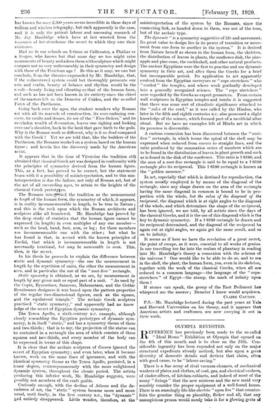OLYMPIA REVISITED.
REFERENCE has previously been made to the so-called " Ideal Home " Exhibition at Olympia that opened on the 4th of this month and is to close on the 25th. Con- siderable ingenuity has been expended not only on the major structural expedients already noticed, but also upon a great diversity of domestic details and devices that claim, often with good cause, to be " labour-saving."
There is a fine array of rival vacuum-cleaners, of mechanical washers of plates and clothes, of coal, gas, and electrical cookers, of cinder-sifters, of kitchen-cabinets, and indeed of most of the many " fixings " that the new mistress and the new maid very sensibly consider the proper equipment of a well-found house. There is an amazingly life-like electric " open fire " that counter- feits the genuine thing so plausibly, flicker and all, that any unsuspicious person would surely take it for a glowing grate of
honest coals. On the same stand is shown a boiler that success- fully combines the two distinct and usually separate functions of providing the domestic supply of hot water and, when desired, of heating the house by radiators. The obvious drawbacks to the ordinary double-duty arrangement are here avoided by sealing up the heating water in a separate inner-circulation system within the boiler proper.
An exhibit that is at once instructive and diverting is the small though arresting display in the gallery by the Design and Arts Association. Nothing on the stall is for sale, and its wares are all contributed anonymously. They are the sheep and the goats of the " Glass, Cutlery, Hardware, and Turnery Depart- ment," and the " D.A.A." has sat in judgment upon them and divided the righteous from the naughty, and set them re- spectively on the right hand of the stall and upon the left, according as they were to be admired for the pleasing reason- ableness of their design or mocked at for their foolish extrava- gance and inutility.
Amusing labels are attached to the various exhibits for the guidance of those who have not yet attained to the attitude of William Morris to the things of daily use. He counselled us to have nothing in our houses that we did not know to be useful or believe to be beautiful. Did we act on his excellent advice, the fuel problem would, at any rate temporarily, be solved for some of us, and we might mend the roads with such of our trash as was incombustible.
Of the Royal nurseries we have perhaps already heard enough. Indeed the captious might be inclined to think that they had nowhere avoided the obvious except in the matter of con- venience. Where, for instance, are the ventilated cupboard, the baby level crawling window, the child level blackboard panel and washstand, the nurse level bath and drying and dressing platform, that one expects to find in the well-equipped modern nursery ?
However, though we may regret a certain lack of inspiration that is often manifest in such exhibitions, there is no doubt that they do serve a very definite useful purpose. They educate the public, not the citizens of the future, but the actual housewife and householder. They set the right note in their insistence upon three points—comfort, economy, and the saving of labour. For on the day when " The Englishman's Home," cottage as well as villa, is really comfortable, and really economically run, on that day social unrest, political and moral, will receive a harder blow than could ever be struck at it by any Act of



































 Previous page
Previous page